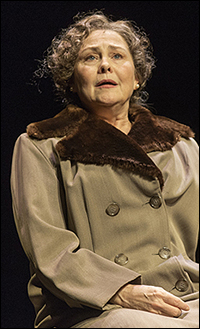
*
Southern-born stage actress Cherry Jones, who took home Tony Awards for her performances in the award-winning productions of the 1995 revival of The Heiress and the John Patrick Shanley drama Doubt, reluctantly admits that Amanda Wingfield — the faded and flawed Southern belle brought to life in The Glass Menagerie by iconic playwright Tennessee Williams — was never a role on her radar. Laura Wingfield was. However, the actress never got the chance to play Laura — the role crafted by two-time Tony nominee Celia Keenan-Bolger in the 2013 Broadway revival of The Glass Menagerie, which will officially open Sept. 26 at the Booth Theatre. Instead, Tony-winning director John Tiffany (Once) convinced Jones to play Amanda in a reading of Menagerie, and the rest was history.
The actress, who now cannot explain the thrill she is given from stepping into Amanda's shoes nightly in Menagerie, returns to her Southern roots to navigate Williams' language and explore the classic memory play set in 1937 St. Louis. Playbill.com spoke with Jones — whose Broadway credits also include A Moon for the Misbegotten, Our Country's Good, Mrs. Warren's Profession, Angels in America and Faith Healer, among others — at press day for The Glass Menagerie.
What I find so fascinating is that you've said before that you did not want to play this role…
Cherry Jones: I'm so embarrassed about that! I'm so sorry I ever admitted that. Clearly, I lacked depth and life experience when I felt that way about this play because now, at almost 57 years of age, I've realized what a gift it is to us — what a masterpiece [The Glass Menagerie] is. I've never enjoyed performing anything as much in my life. I've never gotten the rush that I get performing Amanda Wingfield. This cast… We're not close; we are exceptionally close — as people — and, obviously, it is one of the most intimate units of characters that have ever been written in the American theatre. To be doing [the show] with [director] John Tiffany — whom I really, truly believe is at least kind of a genius — it's just been, of my 30-some-odd years in the theatre, the most exquisite production that I've ever had the privilege of working on. And, I don't mean to oversell it! I mean that from the bottom of my heart.
You're from the South — born in Tennessee — so tell me about interpreting Tennessee Williams' language. Did you feel a strong connection to the world when you approached the script?
CJ: You almost feel like you're cheating because he writes so true to the poetry and the melody of Southern women of a certain period. I grew up with those women. When I was ten, the women who were actually Edwina Williams' [the mother of Tennessee] age were in their 80s, and I knew those women well. They were the choir mistress at the church, they taught me piano — Ms. May Coram, Ms. Margaret Porter, Ms. Jule Compton — and they all sounded like Amanda Wingfield. They were very different than Amanda Wingfield, but I almost feel like I'm cheating. It's almost too easy for me because I crave getting to do it. It's like my childhood.
 |
||
| Jones in The Glass Menagerie. |
||
| Photo by Michael J. Lutch |
CJ: When I was younger, I kept thinking surely someone would cast me as Laura. I auditioned for it several times, but I guess I was a little too "hale and hearty" for Laura. [Laughs.] [Actor] Peter Frechette and I auditioned together for Julie Harris' production [in 1994]. We did not get the roles, and when we left the callback, Peter Frechette said, "We can only play Tom and Laura if Nancy Marchand were playing Amanda." [Laughs.] Tell me about the character of Amanda. She's flawed. How do you find the balance between portraying a polished Southern belle, yet having such flawed qualities?
CJ: She's desperate is what she is. She has somehow managed to feed and clothe and house those children for their entire childhood and teenage years, and now they're in their twenties, and she has a mentally [and] physically challenged child, [Laura Wingfield, played by Keenan-Bolger]. And, like everyone who has ever had a child who cannot survive on their own, the nightmare is: What will happen to that child when I'm gone? So, I have tremendous sympathy for this woman, who is on a mission to either get this child socialized and able to work or married to a good man who will always care for her. To me, [Amanda] is this great heroine who is, unfortunately, ill equipped for the job.
In our Playbill.com column Cue & A, actors often respond that the one performance they wished to have seen was Laurette Taylor's in The Glass Menagerie. It's been said that her performance was iconic. Taking on this role, are you feeling any pressure?
CJ: No… I've read her biography ["Laurette. The Intimate Biography of Laurette Taylor"] while I was doing the play [at the American Repertory Theater] — avoiding [details about] The Glass Menagerie at the end of the book until we had closed, to tell you the truth. But I feel so close to her. Everyone should read that biography. It's called "Laurette." It's by [her daughter] Marguerite Courtney. Her life read like fiction. But, you know, bless her heart — we lost her before she could do the film [of The Glass Menagerie], and that early death made it possible for women to approach this role because she was the end-all. She must have been the "be-all and the end-all" in that role. Had we had it on film, it might have been very difficult for us to take it on, but, God, I would have loved to have seen it!
(Playbill.com staff writer Michael Gioia's work appears in the news, feature and video sections of Playbill.com as well as in the pages of Playbill magazine. Follow him on Twitter at @PlaybillMichael.)









